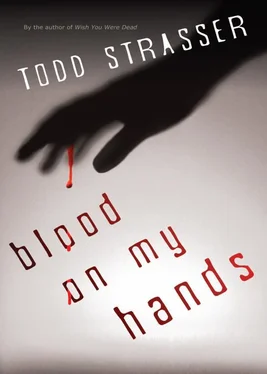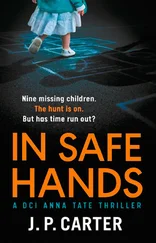The man’s voice: “Well, that’s about it for the tour.”
The woman: “Thank you. It’s been wonderful. You’ve done a very good job.”
A door opens and closes.
The woman: “How much time?”
A different man’s voice: “About five minutes. Looks like there’s about a hundred people out there.”
“Channel Twelve?” the woman asks.
“No, but Simmons from the Journal with a photographer. And that new girl from the Shoreline Express.”
The woman replies, “All right, I’m just going to freshen up and review some notes. I’ll be right down.”
A door opens and closes. The lounge becomes quiet. Is it possible that Congresswoman Jenkins is here alone? That this little part of my plan has actually worked? My heart is thudding, and despite the coolness around me, my skin feels warm and moist. I’m scared about what’s going to happen next. I press my fingers against the inside of the cabinet door and a crack of light peeks in. I can’t see Dakota’s mom. I’m starting to push the door farther when I hear what sounds like her speaking on a phone: “Yes, half an hour at the most. Right. What did Salinger say about the spending cuts? Good, good. Well, we’ll just have to see if they get enough votes. What? I know, it’s hard to believe that they haven’t found her yet. The whole police force looking for one kid and they can’t figure out where she is. What can I say? He’s my brother. I know it looks bad. Well, hopefully they’ll find her soon and put an end to it. Uh-huh. Yes. I’ll speak to you later.”
The phone snaps shut. The lounge is quiet. It’s now or never. Blood pounding in my ears, I push open the cabinet door and crawl out. Congresswoman Jenkins is standing near the window with an open compact, taking advantage of the sunlight to touch up her makeup.
“Excuse me?”
Startled, she jerks her head up from the compact, then frowns when she sees me. Her eyes dart to the door, as if she doesn’t understand how I got in here without her noticing. “Yes?”
She has no idea who I am. To her I’m just some little kid dressed in pink and white who’s magically appeared out of nowhere.
“I have to talk to you about Katherine Remington-Day,” I begin.
Her eyes widen with surprise, then narrow as if to focus more clearly. “You’re… the Carson girl?”
I nod and her eyes again go to the door. Is she considering whether to dash through it? Call for help?
“Please,” I beg her. “The night Katherine was killed, Dakota knew about it before anyone else. She told me where to look for the body. If you go home today and check your knives, you’re going to find that you’re missing the one that matches the description of the murder weapon.”
Congresswoman Jenkins stares at me. It must be a lot to take in all at once. “You’re saying… that my daughter Dakota killed Katherine? With a knife from my kitchen?”
With a slow nod I reply, “I don’t expect you to believe me. No mother would. But I have to ask you to consider what I’m saying. I bet you had no idea that she sent death threats about Katherine.”
Dakota’s mother’s eyebrows sink into a V. I expect the next thing she says to be that she doesn’t believe me. Instead, she asks, “How do you know about that?”
This catches me completely off guard. She knows about the death threats? “Griffen Clemment told me. He’s the one Dakota-”
“I know who he is.” She cuts me short, then stares at me again, as if trying to decide what to do next. “What do you want from me?” she finally asks.
“I want you to consider the possibility that what I’m saying might be true. That the police are looking for the wrong suspect. That this whole thing is a huge mistake.”
“Why can’t you tell them yourself?”
“They’ll never believe me. All the evidence makes it look like I did it.”
“Yes, everyone’s aware of that.” Her voice hardens. She’s moved past astonishment. Her protective instincts have kicked into gear. “Did Slade Lamont tell you to do this?”
All I can do is shake my head. I can’t think of anything to say. How can she know about Slade? How much more is there that I don’t know?
She purses her lips and nods slowly, as if my silence is affirmation. “Whatever you have to say, you can say to the police… yourself.” Her voice becomes stern and cold. She walks across the room, opens the door, and leaves.
I run to the closest window and yank it open, then hurry to the old pool table. After Slade said good-bye this morning, he left the end ajar. Now I wiggle in feetfirst and swing the end closed, sealing myself inside like a trapdoor spider.
It’s dark except for the light that comes down through the pockets. Lying flat and straight, I barely have room to fit under the gullies.
I still can’t understand how Dakota’s mom could know about Slade.
But there’s nothing I can do now except wait.
DOES MONEY MAKE YOU POPULAR?
by Callie Carson
For as long as there’s been high school, students have wondered what makes kids popular. Some people say the standard for popularity changes from generation to generation. Is having money the standard for our generation?
It’s the age-old question: what does one have to do to be popular? After grades, it could be the biggest concern some students have. And in some cases, it may be even more important than grades. There was a time when it was easy to know who was popular and who wasn’t. If you were a jock or a cheerleader, you were popular. Then it changed. Sometimes it seemed like the coolest and most popular kids were the ones with their own bands. Or the artists. Or the kids in student government. Or even the brainiac geeks, with their super-high GPAs and science awards.
But lately a new group seems to dominate. They may have talent, or none at all. They might be pretty, or get good grades, or not. What’s the one thing they do have? Money. Enough to spend whatever they want on clothes and entertainment and other kinds of fun, and never even have to think about it.
The strange thing is, with one or two exceptions, these kids didn’t earn a penny of it themselves. For the most part they’ve never had to work a day in their lives. It’s not like in the old days, when kids had to be good at something to be popular. Back then, athletes and cheerleaders had to train. Musicians had to rehearse. Student government kids had to campaign and run for election. Geeks had to study.
These days, it seems, all you have to do is be born rich.
Wednesday 11:02 A.M.
SILENCE. I LIE in my new hiding place in the pool table, feeling worried and scared and baffled. Then comes a rumble of commotion and voices in the hall. A door bangs open and I hear heavy footsteps and breathing as several people rush into the room.
“Check everywhere,” a man orders. “The closets, cabinets, everything.”
I hear shuffling, banging, and the scraping of furniture being moved. “She’s not here, sir.”
“The window,” someone says.
“Damn it!” another man grunts, as if angry with himself that he didn’t notice it sooner.
“You think she went down the fire escape?”
“Down, or up. One of you go each way.”
More grunts. I imagine two police officers climbing out the window to the fire escape. A walkie-talkie crackles on. A man in the room asks, “Any sign of her?”
“Negative,” comes the reply over the walkie-talkie.
“McGregor and Petersen, you in the front?” asks the man.
“Yes, sir.”
“I want one of you on either side of that crowd. Watch for her.”
“Ten-four, sir.”
Читать дальше












